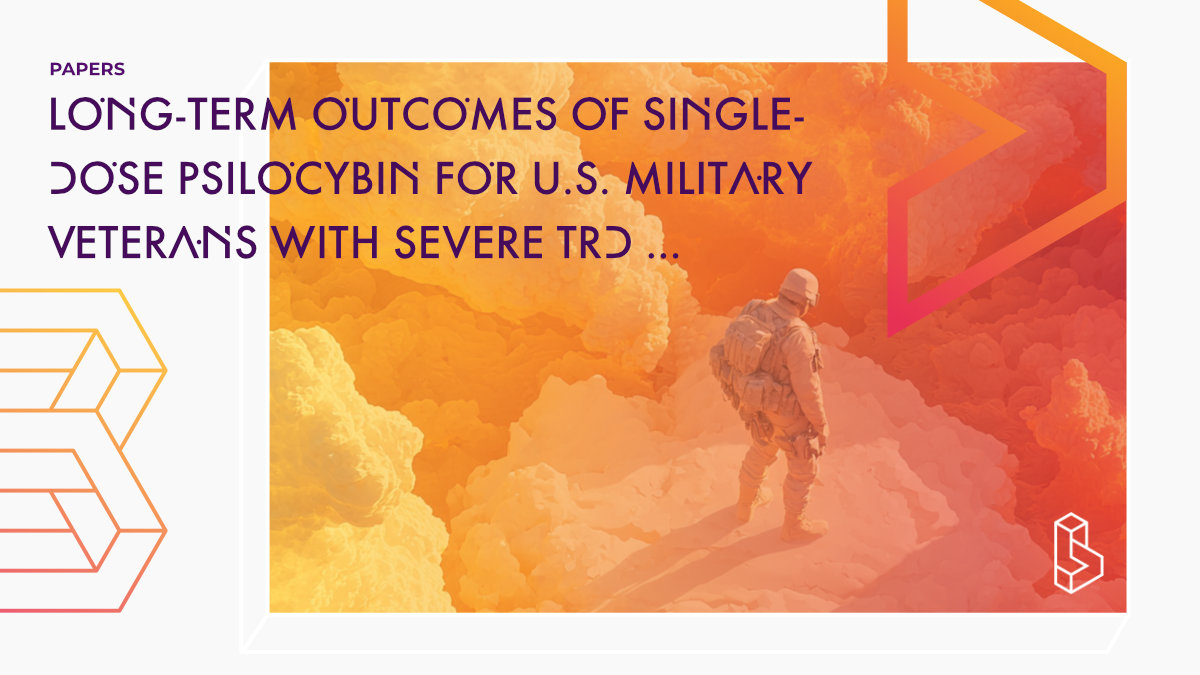This open-label follow-up study (n=10) of Veterans with severe treatment-resistant depression (TRD) found that a single dose of psilocybin (25mg) significantly reduced depression for up to 12 months, though effects began to wane after 6 months, with 40% maintaining response and 30% maintaining remission at the 12-month follow-up.
Abstract of Long-term outcomes of single-dose psilocybin for U.S. military Veterans with severe treatment-resistant depression
“Background: One-third of Veterans with major depressive disorder suffer from treatment-resistant depression (TRD). This is the first study to evaluate the long-term outcomes of psilocybin in Veterans with severe TRD.
Methods: This paper presents 12-month results from an open-label pilot study assessing the effects of 25 mg psilocybin in Veterans with severe TRD, defined as a major depressive episode failing to respond to ≥5 treatments, or lasting >2 years. 10 out of 15 participants completed the 12-month follow-up. Depression severity was measured by Montgomery-Åsberg Depression Rating scale (MADRS) at 6, 9, and 12 months posttreatment. Response was defined as ≥50 % reduction in MADRS, and remission as ≤10 MADRS score.
Results: Depression scores show significant reductions from baseline across all timepoints. However, there was an increase in MADRS scores from short-term timepoints (Weeks 3 and 12) to Month 12. Of 10 participants, at Month 6, 80 % met response and 50 % met remission criteria for the MADRS. At Month 9, acute responses began to wane. At Month 12, 40 % maintained response and 30 % maintained remission.
Limitations: Limitations include the small sample size and its uncontrolled, unblinded design.
Conclusions: In this first-of-kind study on long-term effects of psilocybin for Veterans with severe TRD, depression scores showed significant sustained reductions up to 12-months. However, the antidepressant effects began to wane at 6 months, and then more substantially after 9 months, although these increases in MADRS did not reach statistical significance. Further research is needed.“
Authors: Sara Ellis, Catherine Bostian, Anna Donnelly, Wendy Feng, Katherine Eisen, Melanie Lean, Elizabeth Conlan, Michael Ostacher, Scott Aaronson & Trisha Suppes
Summary of Long-term outcomes of single-dose psilocybin for U.S. military Veterans with severe treatment-resistant depression
Major Depressive Disorder (MDD) affects over two million U.S. military Veterans, with a substantial proportion experiencing treatment-resistant depression (TRD), defined as failure to respond to at least two pharmacological treatments during a depressive episode. TRD in Veterans is associated with severe impairment, higher rates of comorbid conditions, increased healthcare costs, and greater risk of relapse. Existing therapies are often inadequate, highlighting the need for novel interventions.
Psilocybin, a naturally occurring psychedelic compound acting primarily on the serotonin 2A receptor, has shown promise in early trials for various mental health conditions. In a prior open-label pilot study, Ellis and colleagues found that a single 25 mg dose of psilocybin led to high rates of response and remission among Veterans with severe TRD at three and twelve weeks post-dosing. However, long-term outcomes beyond 12 weeks remain poorly understood. This follow-up study investigates the durability of therapeutic effects up to 12 months following a single psilocybin dose.
Methods
Study Design and Participants
This open-label pilot study involved a long-term follow-up of U.S. military Veterans who participated in an earlier psilocybin trial. Out of 15 original participants, 10 elected to participate in the 12-month extension. Participants were aged 18-65, had a diagnosis of severe TRD (defined as failure of ≥5 treatments or episode >2 years), and had a baseline depression score of ≥18 on the Hamilton Rating Scale for Depression (HRSD). They had previously undergone a tapering process to discontinue serotonergic medications.
Find this paper
https://doi.org/10.1016/j.jad.2025.119655
Paywall | Google Scholar | Backup | 🕊
Cite this paper (APA)
Ellis, S., Bostian, C., Donnelly, A., Feng, W., Eisen, K., Lean, M., ... & Suppes, T. (2025). Long-term outcomes of single-dose psilocybin for US military Veterans with severe treatment-resistant depression–12-month data from an open-label pilot study. Journal of Affective Disorders, 119655.
Study details
Compounds studied
Psilocybin
Topics studied
Treatment-Resistant Depression
Depression
Study characteristics
Original
Original Re-analysis
Open-Label
Longitudinal
Follow-up
Participants
10
Humans
Compound Details
The psychedelics given at which dose and how many times
Psilocybin 25 mg | 1xLinked Research Papers
Notable research papers that build on or are influenced by this paper
Single-dose psilocybin for U.S. military Veterans with severe treatment-resistant depression - A first-in-kind open-label pilot studyThis open-label trial (n=15) evaluates the efficacy and safety of psilocybin (25mg) in veterans with severe treatment-resistant depression (TRD). It finds that 60% of participants met response criteria and 53% met remission criteria at 3 weeks post-treatment, with 47% maintaining response and 40% maintaining remission at 12 weeks.
Single-Dose Psilocybin for Depression With Severe Treatment Resistance: An Open-Label Trial
This open-label trial (n=12) conducted at Sheppard Pratt Hospital finds that psilocybin (25mg) significantly decreases depressive symptoms in patients with severe treatment-resistant depression (TRD) at 3 weeks (MADRS −15.8) and 12 weeks (MADRS −17.2) post-treatment. Exploratory analyses suggest the Oceanic Boundlessness dimension correlates with antidepressant responses, while patients with comorbid PTSD show reduced antidepressant effects.
Linked Clinical Trial
An Open Label Study of the Safety and Efficacy of Psilocybin in Participants With Treatment-Resistant Depression (P-TRD)The primary objective of this study is to evaluate the efficacy of psilocybin (25 mg) administered under supportive conditions to adult participants with severe TRD, in improving depressive symptoms.

